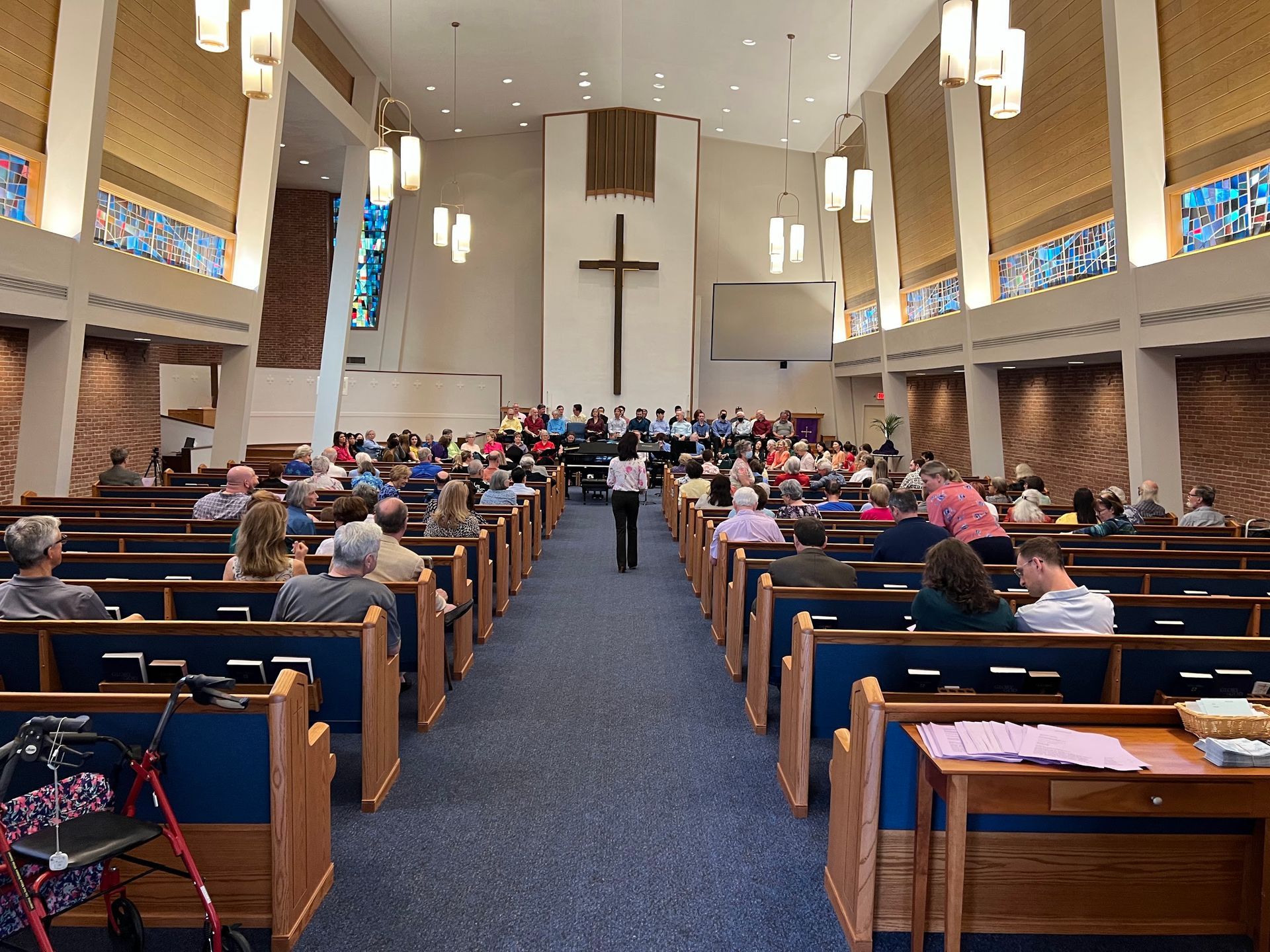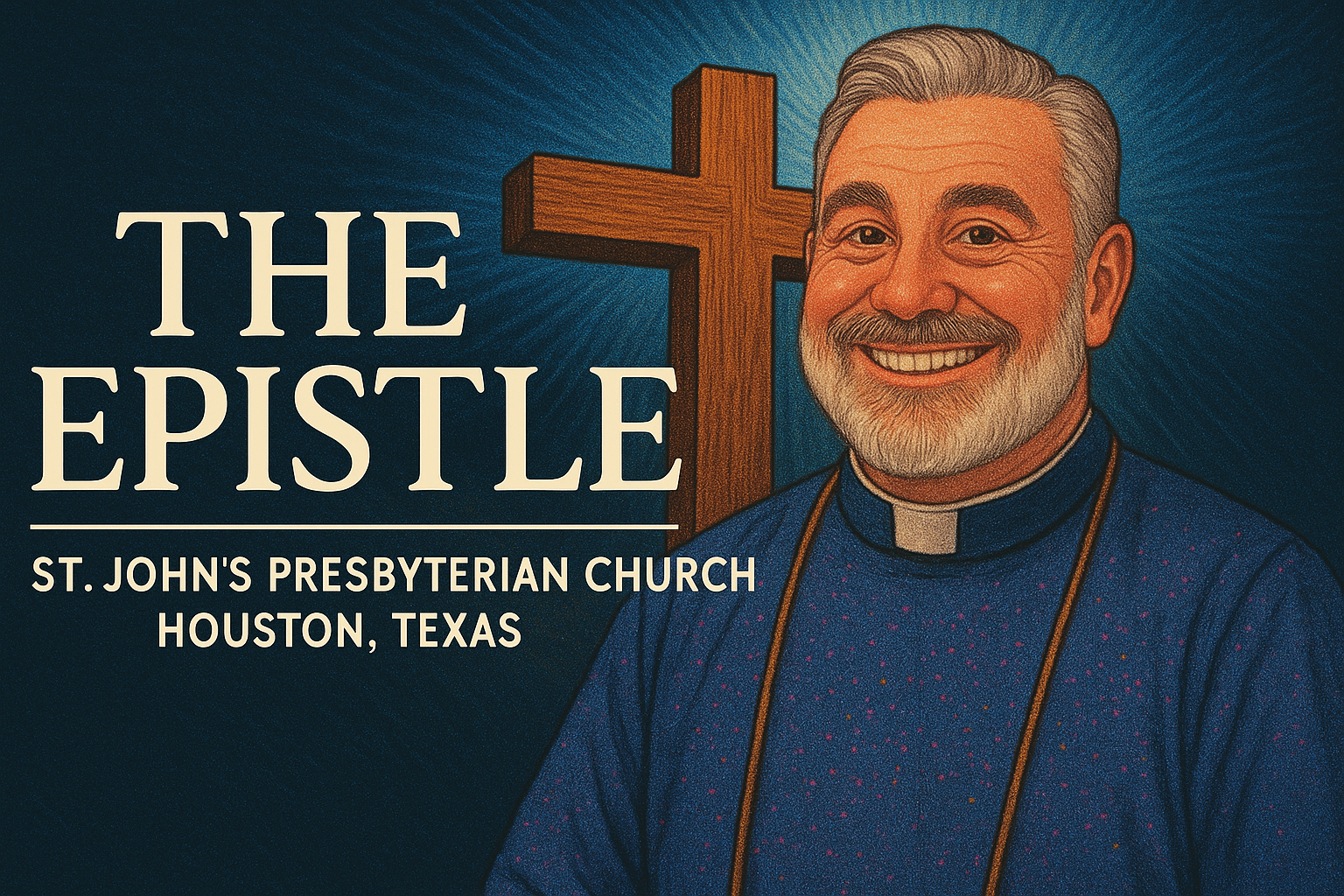The Problem with Church Shopping Today
I remember talking with a couple who moved to Houston back in 2015. Sarah and Mike were overwhelmed by the sheer number of churches they passed. Big ones, small ones, fancy ones, simple ones. Every corner seemed to have another option.
They spent six months visiting different churches, trying to find the right fit. By the time they finally walked through our doors at St. John's, they were exhausted from the search.
That was almost a decade ago, and things have only gotten more complicated since then.
Today, when people search for "church near me" or "best church in Houston," they're not just looking for a building to visit on Sunday. They're searching for something deeper. They want authentic community. Real relationships. A place where faith actually matters in daily life.
But here's the problem. The way most people shop for churches today makes finding that authentic community nearly impossible.
I'm Pastor Jon at St. John's Presbyterian Church in Houston, and I've watched hundreds of people cycle through church after church, always searching but never quite finding what they need. Let me share what I've learned about why church shopping fails so many people, and what you can do differently.
Why Church Shopping Feels Like Dating Apps
Think about how people look for churches now. They scroll through websites. Watch video clips of worship services. Read reviews on Google. Check out social media pages. Maybe they visit once, sit in the back, and slip out before anyone can talk to them.
Sound familiar? It's basically the same approach people use for finding restaurants or choosing a TV show to binge watch.
And that's the first problem.
You can't evaluate authentic Christian community the same way you evaluate a product or service. Community isn't something you consume. It's something you belong to and participate in.
When you approach church like a consumer shopping for the best deal, you end up asking the wrong questions. Instead of "Will I be known here?" you ask "What programs do they offer?" Instead of "Does this church prioritize mission and service?" you wonder "Do I like the music style?"
Consumer questions lead to consumer answers. And consumer relationships stay shallow.
The Megachurch Mirage
Houston has some of the largest churches in America. Thousands of people pack into services with concert-quality worship bands, professional video production, and pastors who are genuinely gifted communicators.
I've got nothing against large churches. They serve a purpose and reach people who might never walk into a smaller church like ours.
But here's what I've noticed. Many people leave these large churches feeling lonelier than when they arrived.
Why? Because you can attend a church of 5,000 people every Sunday for five years and still not have a single genuine friendship. You can serve in their children's ministry or usher team and still feel like a cog in a machine rather than a valued member of a community.
Size creates anonymity. And anonymity prevents the kind of authentic relationships that sustain faith through difficult seasons.
When your marriage is struggling, when you lose your job, when you're facing a health crisis, you don't need inspiring music and motivational messages. You need people who know your name and your story. People who will show up with meals and practical help. People who will pray with you and check on you weeks later when everyone else has moved on.
That kind of community is hard to build in crowds of thousands.
The Problem with Perfect Websites
Every church now has a polished website. Beautiful photos of smiling diverse people. Statements about being "authentic" and "welcoming." Lists of impressive programs and ministries.
But websites can't tell you what a church is really like.
I learned this lesson years ago when a couple visited St. John's after looking at our website. They seemed disappointed when they walked in. "Your sanctuary looks smaller in person," the husband said. "And older."
Fair enough. Our website photos are accurate, but they don't capture the worn pew where Margaret has sat for 40 years. They don't show the stains on the carpet from the coffee fellowship that happens every Sunday. They don't reveal the slightly off-key singing of our volunteer choir.
In other words, our website can't show you that we're real people trying to follow Jesus together, with all the beautiful imperfection that involves.
The same is true for every church. The glossy presentation on the website rarely matches the actual experience of being part of that community. Some churches are better than their websites suggest. Others are worse.
You can't know until you show up and actually engage with the people.
What People Tell Me They're Really Looking For
After 30 years in ministry, I've had hundreds of conversations with people searching for a church home. Underneath all the surface concerns about music style or program offerings, here's what people actually need.
They need to be known. Not just greeted with a smile and a handshake. Actually known. Where people remember your name, ask about your kids by name, notice when you're absent and check on you.
They need depth. Real Bible study that goes beyond feel-good devotionals. Sermons that challenge comfortable assumptions. Worship that engages both mind and heart rather than just creating emotional experiences.
They need mission. A church that doesn't just talk about helping others but actually does it. Where service isn't a separate program but flows naturally from how the community understands following Jesus.
They need grace. Space to bring doubts and questions without judgment. Freedom to admit struggles without pretending everything is fine. Authentic relationships where people share real life, not just highlight reels.
They need consistency. Leaders who practice what they preach. A community where people actually live out the values they claim on Sunday morning.
The problem with most church shopping approaches? They can't reveal any of these things. You can't tell from a website whether a church offers genuine community. You can't know from one Sunday visit whether people will still care about you six months from now.
The Questions Church Shoppers Ask
vs. The Questions They Should Ask
Let me contrast the typical questions people ask when church shopping with the questions that actually matter for finding authentic community.
Typical question: "What style of music do they have?"
Better question: "Do people actually sing, or do they just watch the worship team perform?"
Typical question: "What programs do they offer for my kids?"
Better question: "Will other adults in this church know my children and care about their spiritual growth?"
Typical question: "Is the pastor a good speaker?"
Better question: "Can I actually talk to the pastor when I need spiritual guidance?"
Typical question: "How big is the church?"
Better question: "Will I be missed when I'm absent?"
Typical question: "What do they believe about specific theological issues?"
Better question: "How does their theology translate into actual service to the community?"
See the difference? The first set of questions treats church like a product you're evaluating. The second set asks about relationship, accountability, and authentic community.
How Church Shopping Keeps You From Finding Community
Here's the uncomfortable truth. The very act of church shopping can prevent you from finding what you're looking for.
When you visit multiple churches while keeping your options open, you're telling yourself you're being thorough and careful. But what you're actually doing is staying emotionally distant. You're holding back from genuine engagement because you haven't decided if this is "the one" yet.
Real community can't grow in that kind of soil.
Think about friendships. They don't develop through careful evaluation and comparison shopping. They develop through showing up consistently, sharing honestly, and investing time even when it's not convenient.
The same is true for church community. You can't evaluate your way into authentic relationships. You have to commit your way into them.
I've watched this pattern play out many times. Someone visits St. John's and seems interested. They come back a few times. They participate in a Bible study. People start learning their name and story. Relationships begin forming.
Then they disappear for a few weeks. When they return, they explain they've been visiting other churches to compare. They want to make sure they're making the right choice.
I understand that impulse. But what they don't realize is that during those weeks away, the community they were beginning to build here has moved on. The group they were getting to know has bonded more deeply with the people who kept showing up. Starting over requires rebuilding trust and connection.
It's like dating. You can't build intimacy with someone while you're actively dating other people. Real relationships require focused attention and consistent presence.
The Alternative to Church Shopping
So if the consumer approach to finding a church doesn't work, what does?
Here's what I've seen work for people who successfully find authentic Christian community in Houston.
Start with relationships, not research. Instead of extensively researching every church in your area, ask Christians you respect where they worship and why. Personal recommendations from people who know you will point you toward churches that might actually fit.
Visit fewer churches more deeply. Rather than visiting 20 churches once each, visit three or four churches multiple times. Attend their Bible studies. Talk with members. Ask real questions about how the church functions when crisis hits.
Look for mission engagement. Pay attention to how a church serves its neighborhood. At St. John's, our community garden brings together church members and neighbors who may never attend worship. We support families through Presbyterian Children's Homes and Services. We feed people through Braes Interfaith Ministries. This mission focus isn't a program. It's who we are. Look for that kind of integration between faith and action.
Evaluate the in-between spaces. What happens before and after the worship service tells you more about a church's actual community than the service itself. Do people linger and talk? Do conversations go beyond surface pleasantries? Do you see genuine affection between members?
Ask about hard times. Find out what happens when someone in the church faces job loss, serious illness, or family crisis. How does the community respond? This reveals whether the church's care is real or just talked about.
Consider size strategically. Smaller churches like St. John's offer something large churches simply can't replicate. In a congregation of 150-200 active members, you can actually know most people. Your absence is noticed. Your presence matters. Your gifts are needed. That's hard to find in crowds of thousands.
What St. John's Offers Instead of a Shopping Experience
Let me be direct about what you'll find at St. John's Presbyterian Church, because it's probably different from what you're experiencing in your church search.
You'll be noticed. When you visit, someone will genuinely welcome you. Not because we have greeters assigned to work the doors, but because we're small enough to recognize new faces. And if you come back, people will remember you.
You'll encounter depth. Our sermons aren't motivational speeches. They're serious engagement with Scripture that connects ancient truth to contemporary life. Sometimes that's comforting. Sometimes it's challenging. It's always honest.
You'll find mission opportunities that matter. You won't just write checks to support mission work happening elsewhere. You'll get your hands dirty in our community garden. You'll serve meals to neighbors facing food insecurity. You'll participate in God's work of healing and restoration right here in southwest Houston.
You'll be expected to participate. This might sound like a negative, but it's actually a gift. In smaller churches, everyone's contribution matters. You can't hide in the back row for years. You'll be invited to share your gifts, join a Bible study, help with a project. That expectation creates belonging.
You'll encounter imperfection. We're not polished. Our building shows its age. Our choir isn't professional. Our programs aren't as elaborate as the megachurches down the street. But what we lack in production value, we make up for in authenticity.
The Cost of Authentic Community
Here's something most churches won't tell you upfront. Real Christian community costs something.
It costs time. You can't build genuine relationships showing up occasionally when convenient. It requires consistent presence over months and years.
It costs vulnerability. You have to let people see your struggles, not just your successes. You have to admit when you need help.
It costs flexibility. The church won't always do things the way you prefer. You'll need to compromise and adapt for the good of the whole community.
It costs service. Following Jesus means serving others, and that happens best in the context of a community that knows where help is needed.
Church shopping tries to minimize these costs. It looks for the experience that requires the least from you while providing the most for you. But that approach leads to shallow faith and superficial relationships.
At St. John's, we believe the costs are worth it. Because on the other side of vulnerability and commitment and service, you'll find the authentic community you've been searching for.
How to Actually Evaluate a Church
If you're serious about finding authentic Christian community rather than just shopping for a church experience, here are practical steps to take.
Visit the same church at least four times. Once tells you nothing. Twice gives you a better sense. But four visits lets you see patterns and start having repeated interactions with the same people.
Attend a Bible study or small group. This is where you'll see the church's actual culture. How do people treat each other? How do they handle Scripture? How do they respond when someone shares honestly about struggles?
Ask specific questions. Don't just ask "What do you believe?" Ask "How did this church respond when the Smith family's house flooded?" or "What happens when someone here loses their job?"
Pay attention to your gut. After you've done your homework, trust your instincts. Do you feel comfortable being yourself here? Can you imagine sharing your real struggles with these people?
Commit to a trial period. Instead of keeping all your options open indefinitely, commit to fully engaging with one church for three months. Attend every week. Join a small group. Volunteer somewhere. Then evaluate whether this is where God is calling you to put down roots.
Look for fruit, not flash. Jesus said you'll know a tree by its fruit. What fruit do you see in people's lives? Are they growing in faith? Serving their neighbors? Building genuine relationships? Those fruits matter more than impressive buildings or big budgets.
Finding Your People
The church isn't a building or a program or an event. It's people. Imperfect people trying to follow Jesus together.
When you're searching for a church, you're really searching for your people. The community that will know you, challenge you, support you, and serve alongside you.
Church shopping as it's typically practiced makes finding those people harder, not easier. It keeps you in evaluation mode instead of engagement mode. It focuses on surface characteristics instead of the deeper qualities that sustain faith.
At St. John's, we're not trying to be the biggest church in Houston. We're not trying to have the most impressive programs or the flashiest production. We're simply trying to be a community where people can genuinely know and be known, where faith goes deeper than Sunday morning, and where mission happens through actual relationships and service.
If that sounds like what you're looking for, stop by some Sunday at 11:00 AM. We're at 5020 West Bellfort Avenue in the Westbury area. Park anywhere (we've got plenty of space), walk in, and someone will make sure you feel welcome.
But fair warning. If you keep coming back, people are going to learn your name. They'll ask about your life. They'll invite you to join in what we're doing. They'll expect you to contribute your gifts to the community.
That's not church shopping. That's church belonging. And there's a world of difference between the two.
The search for authentic Christian community is worth the effort. But it requires a different approach than treating church like any other product or service you're evaluating. It requires showing up, opening up, and committing to walk alongside imperfect people who are trying to follow Jesus.
Ready to stop shopping and start belonging? We'll be here when you are.
St. John's Presbyterian Church
5020 West Bellfort Avenue
Houston, TX 77035
(713) 723-6262
stjohns@stjohnspresby.org
Sunday Worship: 11:00 AM
Everyone welcome. No exceptions.
Going Deeper: Resources for Your Journey
If you're wrestling with the questions raised in this article about finding authentic Christian community, I've written several books that explore these themes more deeply.
The Open Church: Faith that Welcomes Questions addresses exactly what many church shoppers are looking for but rarely find: a community where honest questions and real struggles are welcomed rather than seen as threats to faith. This book challenges the superficial Christianity that treats doubt as weakness and explores what it means to build churches where authenticity matters more than appearance. If you're tired of churches that demand certainty you don't feel, this book offers a different way forward.
For those seeking to develop the kind of deep, substantive faith that can't be found through church shopping alone, Stewardship: Faithful, Fruitful, and Flourishing explores what it actually means to live as a disciple rather than a religious consumer. The book connects spiritual formation to practical living in ways that reveal why authentic community requires more than just showing up on Sundays. And Living the Lord's Prayer: A Group Study and Daily Devotional provides exactly the kind of deeper biblical engagement that church shoppers say they want but rarely find in contemporary church settings.
These resources aren't substitutes for finding real community. But they can help you think more clearly about what you're actually searching for and why the consumer approach to church fails so many people. Real faith requires depth, and depth requires the kind of patient study and reflection that our fast-paced church shopping culture often skips right past.





